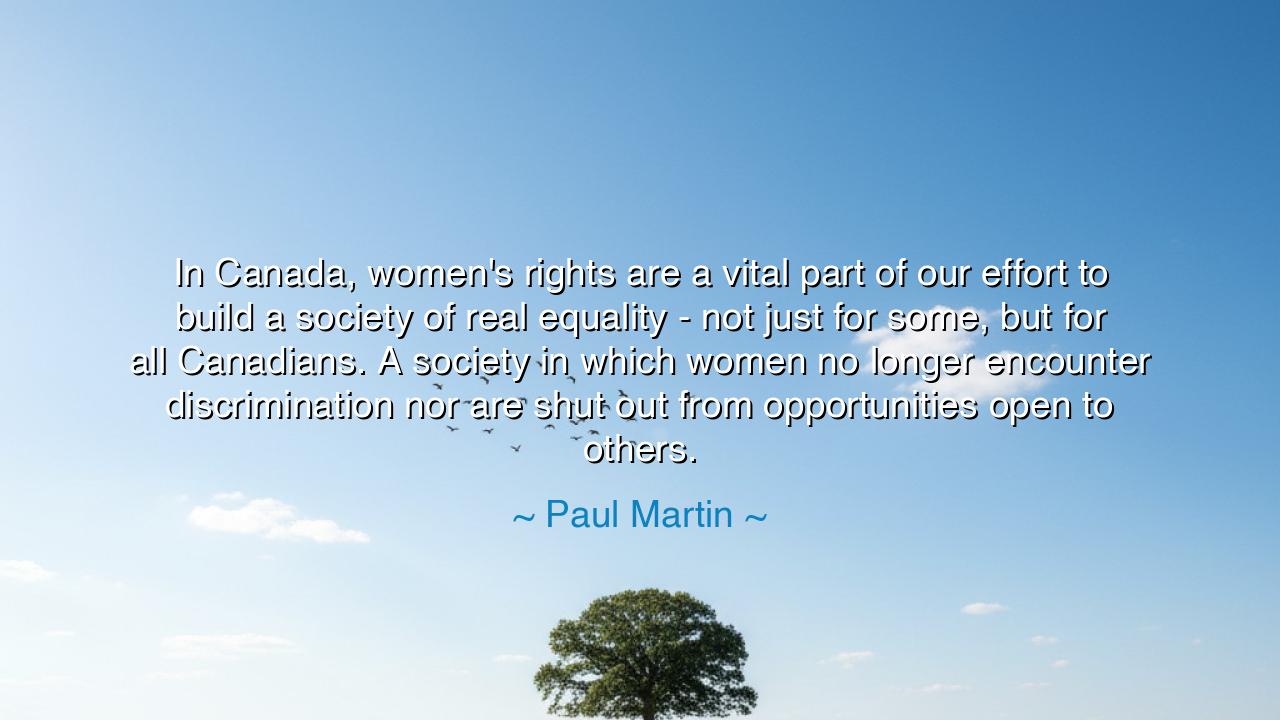
In Canada, women's rights are a vital part of our effort to build
In Canada, women's rights are a vital part of our effort to build a society of real equality - not just for some, but for all Canadians. A society in which women no longer encounter discrimination nor are shut out from opportunities open to others.






The words of Paul Martin, spoken with the solemnity of a leader and the hope of a reformer, resound like the call of a bell through the mists of time: “In Canada, women's rights are a vital part of our effort to build a society of real equality — not just for some, but for all Canadians. A society in which women no longer encounter discrimination nor are shut out from opportunities open to others.”
This is not the rhetoric of politics, but the confession of a nation striving toward its higher self. For equality is not a gift bestowed by the powerful upon the powerless — it is a covenant of conscience, an agreement that the worth of one soul shall not be measured by the shape of the body or the sound of the voice, but by the depth of its spirit.
Martin’s declaration stands within a lineage of struggle and awakening. He spoke as one heir to generations who fought in silence and in fire — women who labored, taught, and dreamed in the shadows of systems that denied them their due. Women’s rights in Canada were not born from gentle reason alone, but from endurance: from the petitions of Nellie McClung and the Famous Five, who, in 1929, fought for women to be legally recognized as “persons” under the law. Before that judgment, a woman could bear children, run households, and till the land beside her husband — but she could not stand in the Senate of her own country. When the Privy Council of Britain finally ruled in their favor, it was not merely a legal victory — it was the dawn of recognition, the moment when the nation’s conscience began to open its eyes.
Yet Martin’s words remind us that the journey did not end there. True equality, he says, must be “for all Canadians” — a phrase that glows with moral fire. For what is freedom if it is partial? What is justice if it serves only a few? To build a nation worthy of its people, equality must become not an ornament of law, but the heartbeat of daily life — expressed in institutions and manners, in how a society treats its workers, its mothers, its daughters, and its elders. It is not enough for women to have rights written on parchment; they must also walk through open doors, free from invisible barriers and the soft cruelty of neglect.
The ancients understood that the strength of a kingdom was not in its armies, but in its harmony. A society that silences half its citizens silences half its wisdom. In the days of old Egypt, the goddess Ma’at stood for balance and truth — the cosmic order that holds heaven and earth together. To violate Ma’at was to invite chaos, and so too it is with human equality. When women are denied their voice, the music of the nation falters; when they rise and are heard, the whole chorus of humanity finds its pitch once more. This is the justice Paul Martin envisioned — a society not only lawful, but balanced in spirit.
Consider the story of Thérèse Casgrain, who led the fight for women’s suffrage in Quebec, where, astonishingly, women were denied the right to vote until 1940. Against ridicule and resistance, she campaigned not in anger but with unwavering grace. Her victory was not only for women, but for democracy itself, for she reminded her people that freedom must not be selective — it must embrace all or betray all. Her courage embodied what Martin later called for: a Canada where no one is “shut out from opportunities open to others.”
Let us then take this teaching to heart. Equality is not a finished monument — it is a living flame that each generation must tend. It demands vigilance, empathy, and the willingness to listen even when comfort urges silence. To honor Martin’s words is to look within and ask: Whom have we left behind? For as long as one voice is unheard, the work of justice remains incomplete. Equality is not a prize; it is a promise, and promises must be kept through action.
Therefore, walk with open eyes and open hands. Stand for those whose paths are still barred, whether by prejudice, poverty, or fear. Raise your daughters to know their power and your sons to honor it. Let your workplaces, your schools, and your homes become places where dignity is shared like light — freely, without measure. For when every woman in Canada, and in the world, may live without discrimination and without limits, then we shall see not only equality fulfilled, but humanity itself made whole.






AAdministratorAdministrator
Welcome, honored guests. Please leave a comment, we will respond soon